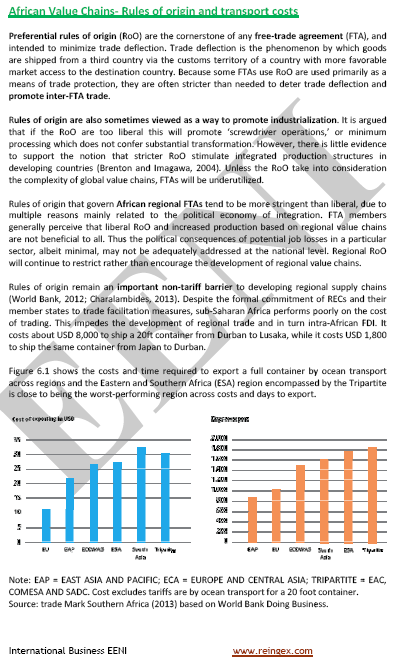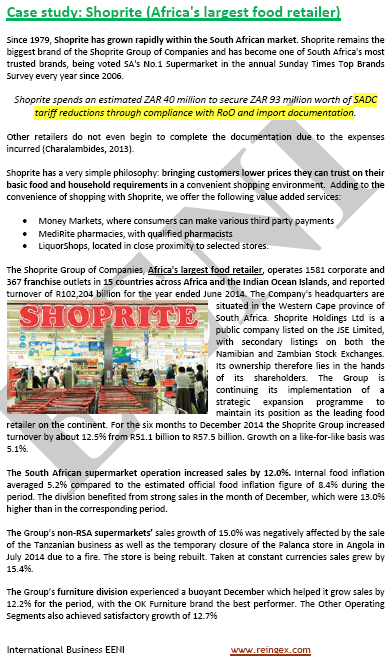
African Value Chains. Transport Costs
Opportunities for African Companies (Value Chains) Export and Transport Costs in Africa
- Introduction to the African Value Chains
- Opportunities for the African Companies
- African Growth Poles
- How the African enterprises can take advantage of the value chains?
- Case Study: The Cocoa Value Chain in West Africa
- Rules of Origin and transport costs
- Export costs in Africa
- Trade Facilitation
- One-stop border post
- FDI Cooperation
- Case Study: Shoprite (the African largest food retailer)
The objectives of the subject “African value chains” are the following:
- To learn how the intra-African trade can benefit from the African value chains
- To assess the importance of the One-stop border post in Africa
- To analyze the impact of the African Value Chains on the transport and export costs in Africa
- To study success stories of the African Value Chains (the Egyptian textile sector, the cocoa value chain in West Africa...)


The Subject “African Value Chains” belongs to the following Online Programs taught by EENI Global Business School:
Courses: Transport in Africa, African Economic Integration.

Masters: Transport in Africa, Business in Africa.
Doctorate: Global Logistics, African Business, World Trade.


EENI Partnerships with Educational Institutions
Languages:  or
or  Chaines Valeur Afrique
Chaines Valeur Afrique  Cadenas de valor africanas
Cadenas de valor africanas  Cadeias de valor africanas.
Cadeias de valor africanas.
The African Development Bank estimates that the cost to transport a container from Durban (South Africa) to Lusaka (Zambia) - 1,633 kilometers/ 1,015 miles- are USD 8,000, and 1,800 from Durban to Japan!.
Sample - African Value Chains:

The Regional Integration in Africa should facilitate the African Value Chains, both for regional and global market.
- Regional Trade and cross-border investments are a key factor for the Value Chains development in Africa
- The role of the Regional Economic Communities is critical, by ex. reducing the Technical Barriers to Trade (Rules of Origin) in Africa
- In some African Countries (South Africa, Egypt, Morocco, Ethiopia, Kenya or Tunisia), the companies are improving their value addition in several sectors

The Regional Economic Communities are working in Trade Facilitation programs, but the trading cost in Africa is not competitive in many cases.
There are good examples of improving the African Value Chains. By example...
- The Cocoa Value Chain in West Africa (mainly in Ghana and Ivory Coast, the World's largest cocoa exporter), has increased from 12% (2000) to 18.6% (2013), by liberalization and incentives programs (economic free zones), attracting the foreign investors
- Today more than 1 Million people in Ivory Coast and 800,000 in Ghana work in the Cocoa Sector. Local farmers are receiving a fixed price (70% of FOB price)
- The Egyptian textile sector has substantially increased his value addition, and today contributes to 27% of the Egyptian total production
- According to the African Development Bank, the One-stop border post can help to reduce clearance times (Customs Procedures) at the borders. By example, between Uganda and Kenya (Malaba), the border-crossing time has been reduced from 24 hours (2011) to 4 hours (2012)
- In Chirundu (border post Zimbabwe - Zambia) the One-stop border post, part of the North-South Corridor, the time for cross the border for lorries has been reduced from 3 days to 2 hours
Sample - Shoprite (African largest food retailer)
South Africa:


(c) EENI Global Business School (1995-2024)
We do not use cookies
Top of this page


